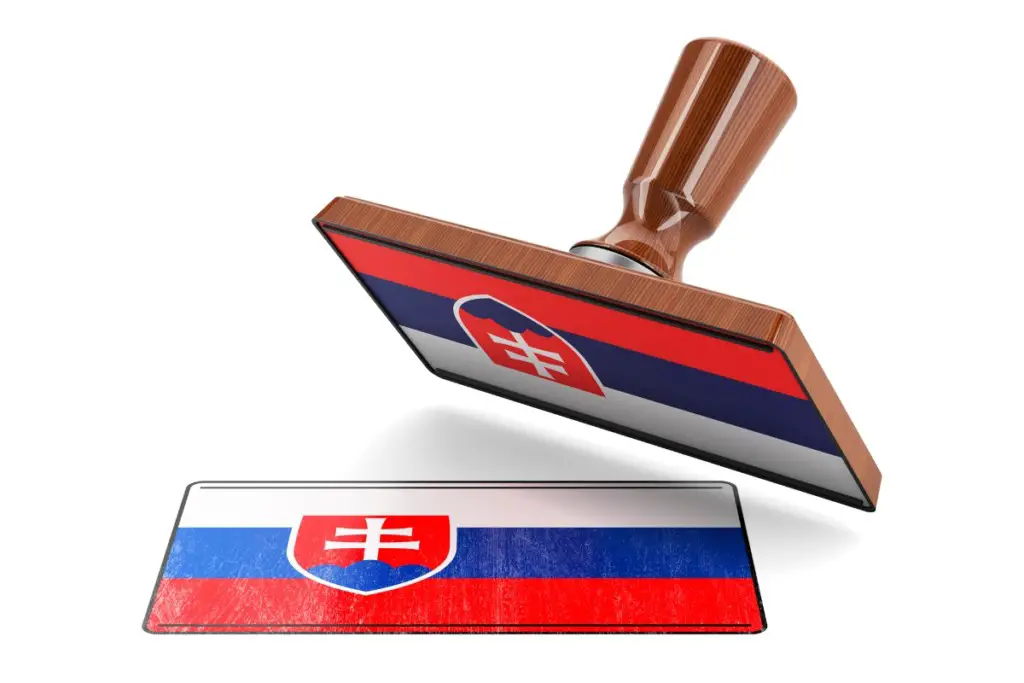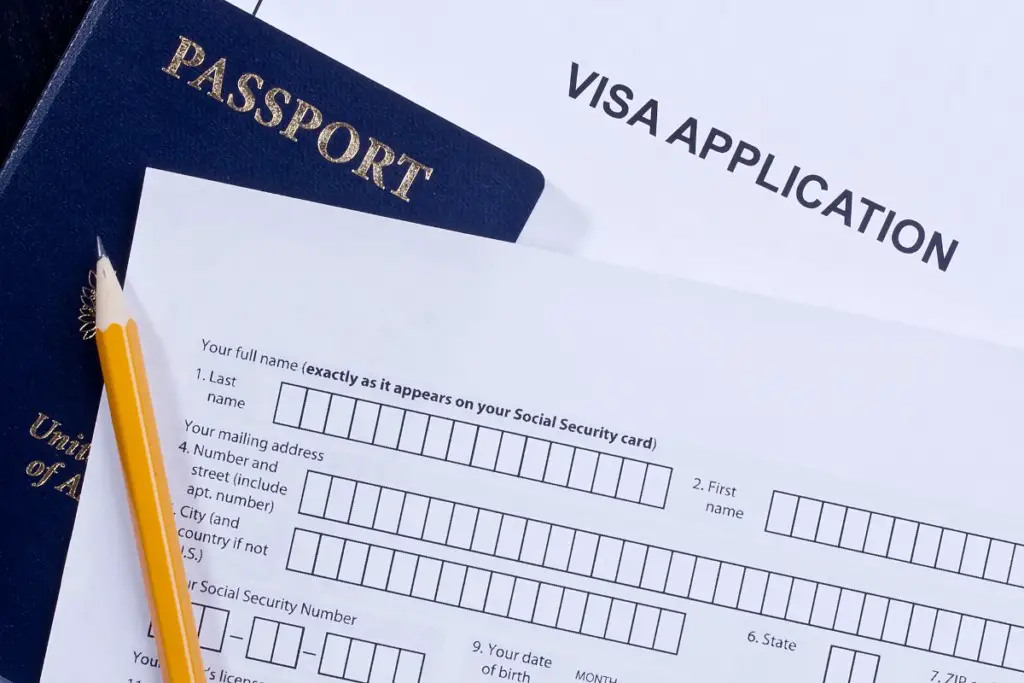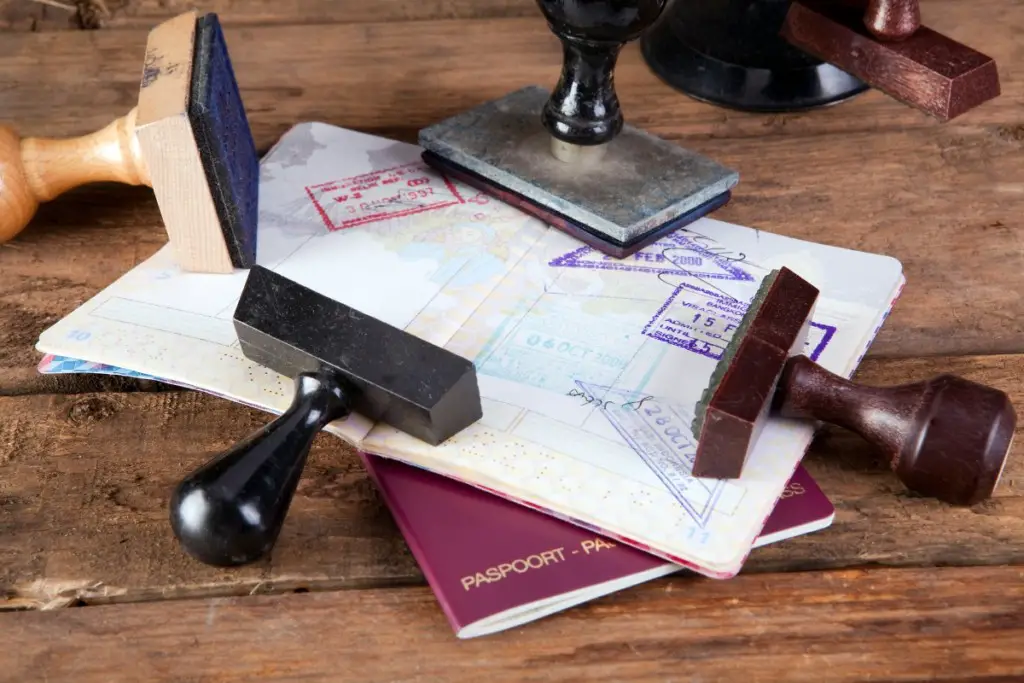As an Amazon Associate, I earn from qualifying purchases with no additional costs for you.
This article covers the fundamentals of visa policies in Slovakia. Detailing the requirements and types of visas needed to enter, study and work in Slovakia.
People from the Schengen area countries do not need a visa to enter. Some people, however, need to have a visa. If you want to apply for a Slovak visa, you need to fill up an application and visit Slovak Representative Office. You will file the paperwork there, and undergo an interview.
Read more to learn all the necessary things when applying for a visa for our little big country.

If you want to buy Slovak gifts or useful Slovak products, you can find them by clicking here (Amazon link).
Do I Need a Visa to Go to Slovakia
To understand the visa requirements for the European Union, you must first understand the border laws, namely Schengen.
The Schengen Area is an area comprising 26 European countries that have officially abolished all passports and all other types of border control at their mutual borders. The area mostly functions as a single jurisdiction for international travel purposes, with a common visa policy.
The visa policy of the Schengen Area is set by the European Union and applies to the Schengen Area and to other EU member states except for Ireland.
The visa policy allows nationals of certain countries to enter the Schengen Area via air, land, or sea without a visa for stays of up to 90 days within a 180-day period. Nationals of certain other countries are required to have a visa either upon arrival or in transit.
As Slovakia is part of the Schengen area, you only need a visa, if your country is listed in the visa policy which you can find here.
A Schengen visa is a short-stay visa that allows a person to travel to any members of the Schengen Area, per stays up to 90 days for tourism or business purposes.
The Schengen visa is the most common visa for Europe. It enables its holder to enter, freely travel within, and leave the Schengen zone from any of the Schengen member countries. There are no border controls within the Schengen Zone.
However, if you are planning to study, work, or live in one of the Schengen countries for more than 90 days, then you must apply for a national visa of that European country and not a Schengen Visa.
Work Visa for Slovakia
You do not need a work visa to work in Slovakia. You do however need a special kind of visa, the National Visa (Visa D) to enter Slovakia if you are from a country not listed in the common visa policy of the Schengen area listed above.
This is because to work in Slovakia, you need to apply for Temporary Residence in Slovakia to be eligible for work here. This is done at the representative office.
Student Visa for Slovakia
The process with Student Visa is the same as with a work visa. The visa you need is called the National Visa, which you need to apply for Temporary Residence as part of your studies here.
TIP: Working in Slovakia as a foreigner has its pros and cons, as it does in any other country in the world. Check out the complete guide about getting work in Slovakia in the article below:
Complete Guide: Getting Work in Slovakia As a Foreigner
How to Get a Visa to Slovakia

To get a National Visa in Slovakia, you will first need to fill out an application form which can be found on official government sites here. Then you will be required to have the base documents.
Which is your passport with a photo as well as a document about the reason for your stay and the need for a visa. This can be a document from your employer or school.
For all this, you have to then physically be present for an interview at the Representative Office in Slovakia. After which you will either have your application approved or declined.
Is It Easy to Get a Slovak Visa
As the requirements for a National Visa are not very hard, it overall is quite easy to obtain a visa in Slovakia. Although this depends on a few factors, like your country or occupation and the reasoning behind getting the visa.
Visa Requirements for Slovakia
Together with the application for National Visa you also need to have these things:
- Application for a National Visa
- Valid travel document (validity of your passport must be at minimum up to 90 days after leaving Slovakia)
- Colored photo (3 x 3,5 cm) capturing your current appearance
- Document confirming your purpose of stay (for example – a document from the police department about granting temporary or permanent residence)
- Document about health insurance for at least the validity period of your National Visa
If you’re applying for a National Visa to get a residence permit at the Alien Police department in Slovakia, you also need these supporting documents:
- Complete application for residence, which must be filed directly in Slovakia
- Proof of accommodation provision in Slovakia for at least the period of your National Visa
- Proof of financial provision for residence in Slovakia for at least the period of your National Visa (for example – affirmation bank statement from a Slovak or International bank with at least 56€/day during your stay in Slovakia)
- Proof of travel into Slovakia
Administrative Fees for Granting a Slovak Visa
Administrative fees for individual types of Slovak visas:
| Type of Slovak Visa | Administrative Fee (eur) |
|---|---|
| Application for the granting of a Schengen visa | €80 |
| Application for a Schengen visa for a child under the age of 6 | €0 |
| Application for a Schengen visa for a child between the ages of 6 and 12 | €40 |
| Application for the granting of a Schengen visa for nationals of third countries with whom agreements have been concluded between the European Union on the facilitation of visa issuance* *The visa requirement does not apply to holders of biometric passports. | €35 |
| Application for a Schengen visa within 3 or 2* days for nationals of the Russian Federation, Ukraine**, and Belarus. * Depending on the conditions regulated by the contract. **The visa requirement does not apply to holders of biometric passports | €70 |
| Application for the granting of a national visa, if it is necessary to fulfill the obligations of the Slovak Republic or in the interest of the Slovak Republic | €35 |
| Application for the granting of a national visa in connection with the submission of an application for residence in the Slovak Republic | €60 |
| Application for the granting of a national visa, if necessary in connection with taking over the granted residence permit in the Slovak Republic | €10 |
Additional fees can be applied in these cases:
Issuance of a Slovak Republic visa at the border crossing: €60
Extension of a short-term visa in the Slovak Republic: €30 (The mentioned fee is paid only in the case of a request for a personal reason.)
Request for verification of an invitation for a foreigner to travel to the Slovak Republic: €33 for each foreigner named in the request for verification of the invitation
Slovak Visa Success Rate
As Slovakia is quite filled with international students and many workers, it is safe to say that the success rate for obtaining a Slovak National Visa is high. It is nothing to be scared about, and definitely easy to obtain.
TIP: Regardless of its small size, Slovakia has a number of international airports. Find out the complete list of regional and international Slovak airports in the article below:
Airports in Slovakia: International, How Many & More Facts
Visa to Slovakia from Different Countries

Since the Slovak republic is part of the Schengen area, it also shares its border policies and visa policies. This means that to enter Slovakia, you might be required to have a visa.
However, there are not that many countries whose citizens need a visa to enter. Most of the countries that are required to have a visa on arrival are located in Asia, Africa, and the Middle East.
Here is the complete list of countries whose citizens need a visa to enter Slovakia:
Africa: Algeria, Angola, Benin, Botswana, Burkina Faso, Burundi, Cameroon, Cape Verde, Central African Republic, Chad, Comoros, Congo, Cote D’Ivoire, Democratic Republic of Congo, Djibouti, Egypt, Equatorial Guinea, Eritrea, Eswatini, Ethiopia, Gabon, Gambia, Ghana, Guinea, Guinea-Bissau, Kenya, Lesotho, Liberia, Libya, Madagascar, Malawi, Mali, Mauritania, Morocco, Mozambique, Namibia, Niger, Nigeria, Rwanda, Sao Tome and Principe, Senegal, Sierra Leone, Somalia, South Africa, South Sudan, Sudan, Tanzania, Togo, Tunisia, Uganda, Yemen, Zambia, Zimbabwe.
Asia: Afghanistan, Armenia, Azerbaijan, Bahrain, Bangladesh, Bhutan, Burma/Myanmar, Cambodia, China, India, Indonesia, Iran, Iraq, Jordan, Kazakhstan, Kuwait, Kyrgyzstan, Laos, Lebanon, Maldives, Mongolia, Nepal, North Korea, Oman, Pakistan, Papua New Guinea, Philippines, Qatar, Saudi Arabia, Sri Lanka, Syria, Tajikistan, Thailand, Turkey, Turkmenistan, Uzbekistan, Vietnam.
Central America: Belize, Cuba, Dominican Republic, Haiti, Jamaica.
South America: Bolivia, Ecuador, Guyana, Suriname.
Pacific Area: Fiji, Nauru, Vanuatu.
Europe: Belarus, Russia.
TIP: Check out my list of recommended Slovak products. They are perfect as gifts, or you will use them during your visit to Slovakia (Amazon links)
- Slovakia Flag
- The book about Slovak History
- Slovak Travel Guide
- Slovakia Adventure Map (by National Geographic)
- T-shirt with Slovakia Flag
- Slovakia Shot Glass
- Legendary Horalky Biscuit (Original)
Visa to Slovakia from the UK
Since the United Kingdom used to be a part of the European Union, it is exempt from visa requirements for the Schengen area. This is still in effect even after Brexit, when the UK held a referendum and left the Union.
The only thing you need to enter Slovakia is your passport.
Visa to Slovakia from Canada
Canada is exempt from the need to have a visa to visit Slovakia and other Schengen area countries. If you plan to come to Slovakia from Canada to work, however, you will need a National Visa as part of acquiring temporary residence to be able to work here.
Visa to Slovakia from Australia
Australia is also one of the countries on the list of Schengen area visa policies. This means that to visit Slovakia, you do not need a visa. You only need your passport.
However, if you plan to work in Slovakia, you will need to apply for a National Visa as well as a temporary residence permit.
Visa to Slovakia from the USA
If you are traveling from the United States of America to Slovakia, you do not need a visa. The United States is on the list of visa-exempt countries. This means that the citizens of these countries do not need a visa to enter the Schengen area of which Slovakia is a part.
You do still need your passport though.
Visa to Slovakia from Dubai
As Dubai is part of the United Arab Emirates, its citizens are exempt from needing a visa to enter Slovakia. If you want to come here for work though, you will need to apply for a National Visa and Temporary residence permit. You also need to have your passport to cross the border.
Visa to Slovakia from India
India is not on the list of visa-exempt countries. This means that if you are planning to visit Slovakia and you are from India, you do need a visa. The type of visa you need is a Schengen visa.
A Schengen visa is a short-stay visa that allows a person to travel to any members of the Schengen Area, per stays up to 90 days for tourism or business purposes.
Visa to Slovakia from Lebanon
When it comes to Lebanon, is on the list of countries that require a visa to enter Slovakia, and the Schengen area as a whole. If you are from Lebanon, you need to apply for a Schengen visa in order to visit any country in the Schengen area, including Slovakia.
Visa to Slovakia from the Philippines
The Philippines is on the list of countries that require a visa to enter the Schengen area. If you are from the Philippines and you wish to travel to Slovakia, you will need to apply for a Schengen visa.
If you want to work in Slovakia, you need to apply for a National Visa and a temporary residence permit.
Visa to Slovakia from Egypt
If you are from Egypt, and you are planning to travel to Slovakia, you will need a Schengen visa since Egypt is on the list of countries that are not exempt from needing a visa to enter the Schengen area of which Slovakia is a part.
In case you are coming to Slovakia for work, you will need to apply for a National Visa and a temporary residence permit.
TIP: Due to its placement in Central Europe, our little big country is surrounded by quite a few EU member states. Find out more about Slovak border states in the article below:
How Many & What Countries Border with Slovakia (Full List)
Conclusion
Slovakia is part of the Schengen area. Which means it has the same visa policies as the rest of the countries in the area. Schengen refers to the EU passport-free zone that covers most of the European countries. It’s the largest free travel area in the world.
A Schengen visa is a short-stay visa that allows a person to travel to any members of the Schengen Area, per stays up to 90 days for tourism or business purposes.
The Schengen visa is the most common visa for Europe. It enables its holder to enter, freely travel within, and leave the Schengen zone from any of the Schengen member countries. There are no border controls within the Schengen Zone.
However, if you are planning to study, work, or live in one of the Schengen countries for more than 90 days, then you must apply for a national visa of that European country and not a Schengen Visa.
In the case of working in Slovakia, you need to apply for a National Visa. This process is pretty straightforward. You need to file the application directly in Slovakia, in the Representative Office.
Getting a National Visa is also a part of the process to get a temporary residence permit, both of these allow you to be in Slovakia, and find and do work here.
The success rate of getting a Slovak National Visa is pretty high, the requirements are not that hard, and most people obtain it without a problem.
Overall, traveling or working in our little big country is fairly simple and easy. And even for those who need to apply for a visa, it is not a hard thing to get.
TIP: Find out how good people in Slovakia speaks English, and how is the ability to speak English connected with various factors such as age, location, and life situation.
Do Slovaks speak English? Read This Before Your Arrival
